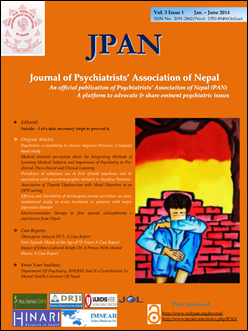Efficacy and tolerability of mirtazapine versus sertraline: an open, randomized study in acute treatment in patients with major depressive disorder
DOI:
https://doi.org/10.3126/jpan.v3i1.11349Keywords:
mirtazapine, sertraline, anti-depressant, major depressive disorderAbstract
Introduction: Mirtazapine is the first noradrenergic and specific serotonergic antidepressant (NaSSA). It has demonstrated efficacy that is significantly superior to older and newer anti-depressant in the initial weeks of treatment in western studies. The specific pharmacologic profile of mirtazapine also means that it lacks many of the serotonergic side effects, in particular, sexual dysfunction. The effectiveness of sertraline is well established in major depression.
Aim: The aim of the study was to compare the anti-depressant efficacy and tolerability of mirtazapine and sertraline in treatment of patients with a diagnosis of major depressive episode attending Psychiatry department of Tribhuvan University Teaching Hospital.
Methodology: A total of 60 patients meeting the inclusion criteria were selected. These patients were diagnosed as depression as per the ICD-10 DCR criteria and were randomized to 6 week treatment with either mirtazapine (N=30, 15-45 mg/day) or sertraline (N=30, 50-150mg/day). Efficacy was evaluated by the HAMD scale, Clinical Global Impression scales (CGI) and UKU side effect rating scale was used for any adverse event noted during study period. Assessments were done on baseline and week 2, 4 and 6.
Result: The primary efficacy variable (mean absolute change from baseline in HAMD score) showed that mirtazapine was significantly (p < 0.05) more effective than sertraline at assessment during 2 and 4 weeks of the study after which there was no statistically significant differences in efficacy (p >0.05) between two drugs. There was statistically significant reduction in CGI- mean severity of illness rating scale score at 2 week ( p< 0.05) in mirtazapine treated patients compared to sertraline after which reduction of score was similar in both group. Both treatments were well tolerated. Tension (57.6%) , palpitation / tachycardia (26.9%), sexual dysfunction (22.9%) were more frequent in sertraline treated patients compared to nausea / vomiting (26.9%) , sleepiness / sedation (23.0%), increased duration of sleep (23.0%) in mirtazapine treated patients.
Conclusion: Mirtazapine was well tolerated and was equally effective as sertraline in reducing depressive symptoms. However, mirtazapine was significantly more effective than sertraline after 2 and 4 week of treatment. The findings need to be confirmed with other large scale studies.
DOI: http://dx.doi.org/10.3126/jpan.v3i1.11349
J Psychiatrists’ Association of Nepal Vol .3, No.1, 2014: 29-34
Downloads
Downloads
Published
How to Cite
Issue
Section
License
This license enables reusers to distribute, remix, adapt, and build upon the material in any medium or format, so long as attribution is given to the creator. The license allows for commercial use.




